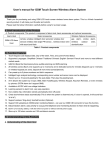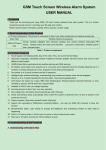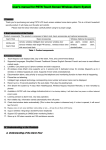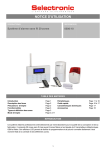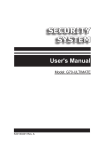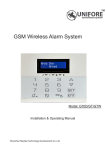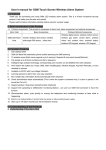Download User manual for GSM alarm system
Transcript
User’s Manual for GSM Alarm System 1. Main Features 1.1 Integrated GSM alarm system 1.2 Concise and elegant design with simple operating interface, CID communication protocol 1.3 LCD screen with calender, available in English, Chinese, Germany, Russian, French and Japanese etc. 1.4 One-key arm operation, coding wireless sensors 1.5 With 30 wireless alarm zones, GSM SMS alert and Telephone alarm 1.6 Can preset 5 groups telephone, with functions of recording, voice indicating and monitoring 1.7 Can distinguish alarming information intelligently, prevent mis-alarms & missing-alarms 1.8 Alarming Priority, history records backup once power failure , AC/DC power both available 1.9 5 methods Arm/Disarm: Remote Controller, Host Keypad , Remote Controlling Keypad(options) , Telephone/Mobile phone and GSM SMS 1.10 2. Internal & external antenna for your options Descriptions of Host panel 2.1 2.2 Specifications Working voltage:100~240VAC Operating power: 9-15VDC GSM Frequency:900/1800MHZ, 900/1800/1900MHZ, 850/900/1800/1900MHZ Wireless Frequency:433MHZ Static current: ≤ 80mA Alarm current: ≤ 500mA GSM transmission power: 2W Operating environment: Temperature: -10-50°; Humid ity:<80% Maximum available quantity of keychain remotes: 4 PCS Maximum available quantity of wireless sensors: 116 PCS Dimension:180*120*5(mm) Zone types and definitions 2.2.1 Zone types: Perimeter zone, Motion zone, Emergency zone 2.2.2 Definitions: Perimeter zone: Detecting the space like doors, windows, etc., generally use wireless door magnet sensors and wireless curtain PIR sensors Motion zone: Detecting the space like living room, aisles and bedrooms, etc., generally use wireless wide-angle PIR sensors Emergency zone: Detecting the space like Emergency area (such as emergency distress, medical rescue, gas leakage and fire alarm, etc., this zone keep 24-hour monitoring status automatically. 1 Generally use panic button, wireless gas sensors and wireless smoke sensors. 2.3 Modes of arming: 2.3.1 “Away Arm” mode:Once any detectors in perimeter zones or motion zones get triggered, the host will alarm immediately and meantime dial “#” automatically. 2.3.2 “Home Arm” mode:Once any detectors in perimeter zones get triggered, the host will alarm immediately and meantime dial “#” automatically. It will not alarm after any detectors in the motion zone are triggered. 3. How to program and setup for the Alarm Host? 3.1 How to program? 3.1.1 Prepare Use “Pin” or similar tools to press the “SIM CARD SLOT”, it can let you to install SIM card Please install a valid SIM card, replace the SIM card slot into the Alarm Host Switch to “on’ from the host panel side to power on the system after you plug into outlet Adjust GSM antenna and check the GSM signal if it is ok 3.1.2 GSM Signal Indicator: Solid on: Host panel didn’t get any wireless net or SIM card didn’t be inserted well Sparkle slow: signal is ok, host panel is in working mode 3.1.3 4.3. GSM signal level: If you press the “▲” or “▼” when host is in standby mode, it will show as below: GSM Signal level: XX YY “XX” is signal level, 2 digits “YY” is signal status, it would say “ok” or “no” “OK” means signal is ok, the host can work properly “NO” means low signal, need to adjust the installation placeof the host panel 3.2 Press“ESC” to exit, or it will exit automatically if without any operations within 30 seconds. How to Setup? Notes: The host will exit programming mode if without any operation within 30 seconds It will exit to the previous menu if press “ESC” If enter codes by mistake for 3 times, the host panel will resume to the standby mode you can press “▲▼” to adjust programming info. Or to find alarming info. The detailed menus in the SET are as below: Main menu Sub-Menu1 Sub-Menu2 Sub-Menu3 Sub-Menu4 Remark Set Time Set time Hour/minute/second Set Date Set date Year/Month/Day/Week Auto-dialer#’s Call center Personal Nbr# Set Protocol CID protocol No need to setup if separate use Entry Delay Entry delay Time delay for entering Exit Delay Exit delay Time delay for exiting Siren On/Off Siren off Siren on SMS phone no. SMS reportng Emergency siren Alarming tele. number Perimeter siren Motion siren Duration time of alarming 2 User Code Enter Usercode No need to setup if separate use Upload Satus? Upload status? Yes no No need to setup if separate use Zone Attribute Zone X number Program Sensor Zone number Alarm History XX: Button Call Failed Status History DISARM 00: 01.01 03:39 X Zone type Bypass Zone? Yes no Group no. Activate Sensor Delete Sensor Attribute Set? Yes no Activate Sensor Learning Deleting Sensor Success For activating wireless sensors For Adding or deleting wireless sensor For viewing alarming history records. “XX”means records No. XX: 01.01 00:08:52 For checking working records The detailed settings are as below: Press “SET” + Enter code( the defaulted code is “888888” )+ ENT, you may see below menus: 3.2.1 【Set time】: This is for setting the host time. Press ENT, then press “ ” button to delete the old record + X X X X X X + ENT → “X X X X X X”: 6 digits, means “hour, minute, second”, each takes 2 digits space. Such as 14:21:20, you may press 142120, now the host time will be 14:21:20. 3.2.2 【Set date】: This is for setting the host date. Press ENT, then press “ ” button to delete the old record + X X X X X X X + ENT → “X X X X X X X”:7 digits,means “year, month, day and week”. eg:2007/01/17 4, means Jan 17th, 2007, Thursday. “0” means Sunday. 3.2.3 【Auto Dialer#’s】: This is for presetting SMS & Reporting telephone numbers. Notes: Totally 5 telephone/mobile numbers The first group is fixed for management center,other 4 groups are fixed for personal numbers Press“▲▼” to select the report method: ”SMS Phone No.” for voice alarming, ”SMS reporting” for SMS alarming Notes: if you choose “SMS Reporting”, it will just sent to mobile numbers not include home phone numbers. Press ENT to confirm each phone(telephone/mobile) number 3.2.4 【Set SMS Phone #s】: Get into the “Auto Dialer r#’s” Menu, Press ENT. You may see ”1: Call Centre”, this is for Manageing Centre. Press ENT again, here has two operations: SMS Phone #’s(4 groups) & SMS Reporting need you setup. Press “▲▼” choose SMS Phone #’s, press ENT to setup “2: Personal Nbr”, press “ ” to delete old record, input the new phone number, press ENT back to SMS Phone #’s , press ENT get into “3: Personal Nbr” setting mode. The operations are same as “2: Personal Nbr”. The “4: Personal Nbr” & “5: Personal Nbr” are same as above operations. 3.2.5 【Set SMS Reporting #s】: Get into the “Auto Dialer r#’s” Menu+ENT+”1: Call Centre”+ ENT, Press “▲▼” choose SMS Reporting, press ENT to setup “2: Personal Nbr”, press “ ” to delete old record, input the new phone number, press ENT back to SMS Phone #’s , press ENT get into “3: Personal Nbr” setting mode. The operations are same as “2: Personal Nbr”. The “4: Personal Nbr” & “5: Personal Nbr” are same as above operations. 3.2.6 【Set protocol】: 【ENT + “▲▼” + ENT】 → “▲▼” to choose “XYJ protocol” or “CID protocol”. Note: ” XYJ Protocol” is the factory’s communication protocol, “CID Protocol” is ADEMCO Contact ID protocol. 3.2.7 【Entry delay】: This is for setting delay time of disarming. Operations: 【ENT + Entry Delay+ press “ ” button to delete old record + X X + ENT】 → “X X”: 2 digits, you can set 00~59 seconds, the default is “00”. 3 3.2.8 【Exit delay】: This is for setting delay time of arming Operations:【ENT + “ ” delete old record + X X + ENT】 → “X X”: 2 digits,you can set 00~59 seconds, the default is “00”. 3.2.9 【Alarm On/Off】: Here has 3 zones(Emergency Zone, Perimeter Zone & Motion Zone) for your options to enable or disable the alarm when sensors trigered. Operations are as below: ENT + Emergency Zone On/Off, press “▲▼” to choose ON or OFF. If choose ON, the system will alarm when sensors trigered. You need to setup the alarming delay time(seconds) in the next sub-menus. Please do as following: ENT +press “ ” to delete old record + input new time X X + ENT. You can set 00~60 minutes, the default is “03” If choose OFF, just press ENT to confirm is ok. Then the system will not alarm when sensors trigered. 3.2.10 【User code】: Here need to setup only based on linking network. Operations: ENT + press “ ” button to delete old record + X X X X + ENT】 → “X X X X”: 4 digits, you can set 0000~9999. Without defaulted User Code. 3.2.11 【Upload status】: This is for uploading Arm/Disarm/Alarm information to the Managing Centre. Operations:【ENT + “▲▼” + ENT】 → “▲▼” choose “yes” or “no” for upload or not upload. The defaulted is “No”. 3.2.12 【Zone Attribute】: Here is for setting【Zone number】,【Zone type】,【Bypass Zone】 &【Entry Delay】. 【Zone number】: 】: Here has 31 zonesfor your settings. 29 wireless zones(Each zone supports up to 4 sensors) and 2 dedicated zones for remotes(Supports up to 4 remotes or wireless keypads per zone). Each zone needs to setup “Zone Type”, “Bypass Zone” & “Entry Delay”. 【Zone type】: You can see “2”, “1”, “0”.( “2” mean motion zone, “1” means perimeter zone, “0” means emergency zone) Press “▲▼” to choose the one you desire to setup, then press ENT to confirm your settings. 【Bypass Zone】: 】: This setting is for make zones enable or disable. Here has “Yes” & “No” for your alternatives. “Yes” means make this zone’s sensors silent, “No” means keep this zone’s sensors working. Press “▲▼” to choose “Yes” or “No”, then press ENT to confirm your settings. 【Entry Delay】: 】: This is for settings delay time of alarming. Here has “Yes” & “No” for your alternatives.The delay duration time please refer to what you have prest in the menu 3.2.7【Entry delay】(page 3). Press “▲▼” to choose “Yes” or ‘No” to setup entry delay or without entry delay. Note: :Press “ESC” to exit from the programming status after finish settings. Below are the “Zones Attribute” lists for wireless sensors programming for your reference: Zone Zone Bypass Entry Number Type Zone Delay 00 ~ 01 02 ~ 10 11 ~ 20 21 ~ 30 —— Emergency zone Perimeter zone Motion zone No No No No No No No No Compatible Accessories Remark Wireless Keychain remote & Wireless Keypad Wireless Smoke Alarm, Wireless Gas Alarm& Panic button. Support up to Wireless Door Magnet & 4 sensors per zone Wireless Curtain PIR Wireless Wide-Angle PIR Motion Sensor 3.2.13 【Program Sensor】 This setting is for adding or deleting Sensors in the above mentioned Zones(Includes Zone 00, 01). The detailed operations are as below: Get into the Program Sensor menu, press ENT to choose Zone Number from different Zone Types(00 ~ 01, 02 ~ 10, 4 11 ~ 20, 21 ~ 30). E.g. if you want to learn a smoke alarm(belong to Emergency Zone) to the alarm host, you have to choose the Zone Number from 02~10(Emergency Zone), can not choose Zone Number from other Zone Types. If have old records, press button to delete, input new number from the keypad, press ENT gets into the Group Number setting mode. This Group Number is for Sensors’ numbers, each zone can be connected up to 4 sensors, the Group Number is from 00 to 03. “00” means Sensor 1, “01” means Sensor 2, “02” means Sensor 3, “03” means Sensor 4. Press ENT gets into Activate Sensor/ Delete Sensor mode, press “▲▼” to make Activate Sensor or Delete Sensor settings. 3.2.13.1 If choose Activate Sensor This means adding Sensors to this host. Operations: Get a sensor learning to the host, the word “learning” will show on the LCD Screen, if have been learned, the word “success” will show on the LCD Screen. Note: If a word “update?” shows on the screen, which means this sensor has been added before, you may choose “Yes” or “No” to decide going on programming or not for this sensor. 3.2.13.2 If choose Delete Sensor, This means deleting the added sensors from the host. Operations: Get into the Program Sensor menu, choose Zone Number and Group Number you desire to delete, press “▲▼” to choose Delete Sensor, press ENT, the host will give a long beep sound. Then the words “Deleting Sensors Success” will show on the LCD Screen, which means you have deleted the sensors successfully. Wireless Keychain Sensor Types Remote The default Zone Number 00 Wireless Wireless WirelessCurtain Door/Window Wide-AnglePIR PIR Sensor Sensor Motion Sensor (N/A) 11 21 12 Wireless Gas Wireless Alarm (N/A) Smoke Alarm 02 03 3.2.14 【Alarm History】 This menu is for checking the alarm history records, able to memory up to 100 records with Alarm Status and time & date. Operations: Get into the Alarm History menu, press ENT to check the first (00) alarm history record, press “▼” to view next other history records. Press ESC to exit the checking mode. 3.2.15 【Status History】 This menu is for checking the ARMED or DISARMED detailed time of the system. Able to memory up to 100 records with time & date. Operations: Get into the Status History menu, press ENT to check the first(00) status history, press “▼” to view next other status history records. Press ESC to exit the checking mode. 4. How to Revise Master code? This setting is for changing the “Enter Code” of the host. The defaulted “Enter Code” is “888888”. If you desire to change, you may do as below: In standby mode, press “SET”, the screen will show ”Enter Code”, you can input “999999”(Fixed code), press ENT, the screen will show “Enter New Code”, please input 6 new digits from keypad, then press “ENT”. Screen will show “Re-enter Code”, pls input this new digits again, and press “ENT” to confirm. Meanwhile the host panel will be back to the standby mode. Note: If input the codes 3 times by mistake, the host will be back to the standby mode automatically. 5. How to operate the Alarm Host? 5.1 Record:Slide the switch on the host panel side to “ON”,keep pressing“ ” and speak close to the speaker of host, and then release, the voice recorded. ” and you will hear the previous record. 5.2 Play:Slide the switch on the host panel side to“DC,keep pressing“ 5.3 Arm:BY wireless remote:press the corresponding arm button and the host will beep once to successfully complete the operation 5 By Host panel(Keypad):【0 + master code + ENT + “▲▼” + ENT】→ “▲▼”to choose “armed home” or “armed away” 5.4 Disarm: By wireless remote: press the corresponding disarm button and the host will beep twice to successfully complete the operation By Host panel(Keypad): 【ESC + master code + ENT 】 →the host will beep twice to successfully complete the operation 5.5 Emergency: By wireless remote: Press Emergency key and the host will alarm immediately; By host panel(Keypad): press 5.6 ,and the host will alarm immediately. Telephone alarm: After receiving the call, you will hear the recorded voice message immediately, it can be played for 30 seconds repeatedly, then follow the below instruction: 5.6.1 Input “8” to enter into the listening status for 20 seconds automatically, you can hear the alarming event sounds from phone. 5.6.2 Input”#” to play the recorded voice message for one time automatically 5.6.3 Input “*”, the host will end the call and stop dialing any auto dialer#. 5.6.4 Directly hang off the telephone, the host will end the call and automatically dial the next auto dialer#. 5.7 SMS reporting: Mobile will get SMS like “ System Alarming XX, YYYY”, “XX” means zone number, “YYYY” means the detailed sensor. 5.8 Arm remotely by phone: 30 seconds after successfully dial the telephone number of host, enter the password of host after the beep---enter 1 after beep—the host will automatically hang up after beep to successfully complete the operation. 5.9 Notes: You can set “Armed Away” remotely by phone, but keep notes that you can’t set “Armed Home” by this way. 5.10 Disarm remotely by phone: 30 seconds after successfully dial the telephone number of host, enter the password of host after the beep---enter 0 after beep—the host will automatically hang up after beep to successfully complete the operation. 5.11 Arm by SMS: You can edit SMS “ XXXXXXBF” to host panel, the host panel would arm automatically when getting this SMS, and also will message back to mobile “Arm successfully”. 5.12 Notes: Arm by SMS is only for “Armed away”! 5.13 Disarm by SMS: You can edit SMS “ XXXXXXCF” to host panel, the host panel would disarm automatically when getting this SMS, and also will message back to mobile “Disarm successfully”. 5.14 Look up alarm history: press “▲▼” to find the “Alarm history”, and then press “ENT” to look up the previous alarm history, at most 100 pieces of history are available can be saved. 5.15 Look up status history: press “▲▼” to find the “status history, and then press “ENT” to look up the previous alarm history, at most 100 pieces of history are available can be saved. 5.16 Alarming dialing mode: After the host goes off, it starts to repeatedly dial the auto dialer#’s for three times ne by one from the first one. The answered number will not be dialed again. 5.17 Power disconnection: If power got disconnected, the host panel will sound “di” each 8 seconds. 6. Descriptions of basic accessories 6.1 Wireless Remote 6.1.1 Features: To control the alarm host to arm and disarm. Away Disarm Home Emergency With the emergency key for urgent help. 6.1.2 Specifications: Operating power: 27A 12V alkaline battery Emitting distance: ≥100m (in open area) Service life: ≤2 years 6.1.3 Installation and Usage: For users to take along. Generally, press the “Away” key to arm before leaving home; and press the “Disarm” key to disarm; “Home” is setting “Armed home”, please take notes that “Arm Home” is only effective for sensors in Perimeter Zone (door sensor\curtain PIR sensor) and sensors in Emergency Zone (Like Gas sensor\Smoke sensor\Glass sensor\Emergency button), it is not effective all sensors in Motion zone(Like wide-angle PIR). 6 Please replace the batteries after one year usage and when you feel shorter control distance. 6.1.4 How to program Please refer to the descriptions of 3.2.13 【Program Sensor】in page4. Note: You can only add 1 remote each time, totally 8 available to be added. Each serial number is available to study 1 remote, the latter configured remote will be workable and the former one becomes not workable automatically. 6.2 Wireless Door Sensor 6.2.1 Features: Generally set as Perimeter zone. If any door or window is opened, it will transmit the Working Light alarm signals to the alarm host. 6.2.2 Specifications: Operating power: 23A 12V alkaline battery Frequency: 433MHZ Door Emitting distance: ≥100m (in open area) Service life: ≤1 year Alarm Distance: <4cm 6.2.3 Installation and Usage Fix the part of magnet onto the door frame in a position of 1.6m above the ground to prevent any children from bumping onto it Fix the part of emitting onto the door frame, make sure to keep the part of magnet and part of emitting in parallel, the space between the two parts shall be less than 10mm Upon the working light flashes frequently in red, please replace the batteries 6.2.4 How to program Please refer to the descriptions of 3.2.13 【Program Sensor】in page4. Note: You can only add 1 wireless door magnet each time, totally 4 available to be added. Each serial number is available to study 1 wireless door magnet, the latter configured wireless door magnet will be workable and the former one becomes not workable automatically. 6.3 Wireless wide-angle PIR Sensor( (Address code: D0~ ~D3: :1101) ) 021 Working Light D0 On / Off D3 Low-Votage Light Power Switch Down/Off Up/On Lens Learning Emitting Switch Jump Line Fix the PIR by pushing it downwards Install the bracket Wa ll Wa ll Keep the switch "on" Wa ll 7 6.3.1 Features: Mainly monitor and control indoor space, generally set as Motion zone. When human body enters into etecting area, the sensor will transmit alarm signals to the alarm host. 6.3.2 Specifications: Operating power: 9V alkaline battery Emitting distance: ≥100m (in open area) Service life: ≤1 year Detecting distance: 110° 10×10m 6.3.3 Installation and Usage Fix the bracket on suitable wall surface or in wall corner at a distance of 2~2.4m above the ground; Open the sensor shell to connect the batteries well and adjust jumper line (short circuit “5S”: The sensor will detect once every 5 seconds; short circuit “5MIN”: The sensor will detect once every 5 minutes; Suggestion: short circuit “5S” for testing and “5MIN” for normal use; Fix the sensor onto the bracket; Adjust the sensor to a proper angle and then slide the power switch on the side to “ON”, and it will enter into the normal working state after 30 seconds; Upon the working light flashes frequently in green, please replace the batteries. 6.3.4 How to program Please refer to the descriptions of 3.2.13 【Program Sensor】in page4. Note: You can only add 1 wireless wide-angle PIR sensor each time, totally 4 available to be added. Each serial number is available to study 1 wireless wide-angle PIR sensor, the latter configured wireless wide-angle PIR sensor will be workable and the former one becomes not workable automatically. 6.4 Wireless Curtain PIR Sensor 6.4.1 Features: Mainly monitor and control indoor stereoscopic space, generally set as Motion zone. When human body enters into the detecting area, the sensor will transmit the alarm signals to the alarm host. 6.4.2 Specifications: Operating power: 9V alkaline battery Emitting distance: ≥100m (in open area) Service life: ≤1 year Detecting distance: 100° 8m 6.4.3 Installation and Usage (As same as the way for Wireless wide-angle PIR sensor) 6.4.4 How to program Please refer to the descriptions of 3.2.13 【Program Sensor】in page4. Note: You can only add 1 wireless curtain PIR sensor each time, totally 4 available to be added. Each serial number is available to study 1 wireless curtain PIR sensor, the latter configured wireless wide-angle PIR sensor will be workable and the former one becomes not workable automatically. 6.5 Wireless Indoor Siren 6.5.1 Features: Work with alarm host, wireless receiving alarm signals, spot alarming with sound and flash With power plug, usually for indoor use. 6.5.2 Specifications: Operating Power: 100~240VAC Receiving Distance:≥100 M(In open area) 6.5.3 Installation and Usage: Plug the wireless siren into suitable indoor power socket Suggestion: Generally around 1.8M from the ground 8 6.5.4 How to program Please refer to the descriptions of 3.2.13 【Program Sensor】in page4. Notes: You can only add 1 wireless siren each time. When configure the wireless siren, you can only operation on the keypad of the alarm host. One siren can be studied to at most 10 wireless alarm hosts, multi wireless sirens are available to be added for each alarm host. 7. Descriptions of Optional accessories 7.1 Wireless Gas Alarm 7.1.1 Features: Mainly monitor and control indoor gas leak, generally set as Emergency Zone. Usually installed in kitchen 7.1.2 Specifications:: Operating power: 110~240VAC,50~60HZ Emitting distance::≥100m (in open area) Inductive gas: Natural gas: 0.1%-0.5% Liquefied petroleum gas (LPG): 0.1%-0.3% 7.1.3 Installation and Usage: Fix the gas alarm onto proper wall surface inside the kitchen. Connect the alarm to the power and it will be ready to detect after two minute 7.1.4 How to program Please refer to the descriptions of 3.2.13 【Program Sensor】in page4. Note: You can only add 1 wireless gas alarm each time, totally 4 available to be added. Each serial number is available to study 1 wireless gas alarm, the latter configured wireless gas alarm will be workable and the former one becomes not workable automatically. 7.2 Wireless Smoke Alarm 7.2.1 Features: Mainly monitor and control indoor fire risks, generally set as Emergency Zone. Replace the batteries for every 1 or 2 year. Usually installed on the ceilings of living room and aisles. Wor king Ligh t Air Hole 7.2.2 Specifications: Tes t But ton Operating power: 9V alkaline battery Emitting distance: ≥100m (in open area) Service life: ≤1 year Monitoring range: 20m 7.2.3 How to program Please refer to the descriptions of 3.2.13 【Program Sensor】in page4. Note: You can only add 1 wireless smoke alarm each time, totally 4 available to be added. Each serial number is available to study 1 wireless smoke alarm, the latter configured wireless smoke sensor will be workable and the former one becomes not workable automatically. 7.3 Wireless Keypad 9 7.3.1 Features: LCD display, calendar function, upgraded and Micro-computer controlling, steady performance Supported languages: Simple Chinese\Traditional Chinese\English\German\French\Russian and more Work with wireless alarm host, with function of armed home\armed away, disarm, emergency Including 3 codes: master code\user's code\distress code Remembers programming settings when power is disconnected Code recorded and resume function Two power ports available, convenient using and easy installation “One key” arming 7.3.2 Specification: Power supply: 12VDC Maximum current: ≤50mA Working environment: temperature: -10~50℃ humidity: ≤97% Product dimension: 125 × 125 × 25 (mm) 7.3.3 Operation and settings Code type and function: Code type: fixed code(9999),master code, user's code Fixed code:9999, 4 digits,can revise master code and user's code Master code:4 digits, set time\date\wireless code User's code:4 digits, control arming\disarming 7.3.4 How to program Notes: LCD screen will exit programming mode if without any operations within 30 seconds It will be back to the last menu if press “ESC” menu If three time putting wrong program code, the host will resume to the very original status If input the codes 3 times by mistake, the host will be back to the standby mode automatically The detailed【 【Programs】 】is as below: Press SET button getting into the programming mode, Enter Code (4 digits), the defaulted enter code is “8888”, press ENT, you may see below menus: 7.3.4.1 【Set Time】: Operations:【ENT + press“ ”to clear old record + X X X X X X + ENT】→ “X X X X X X”: 6 digits, and “hour\minute\second”, each takes two digits space 10 7.3.4.2 【Set Date】: ”to clear old record + X X X X X X X + ENT】→”X X X X X X X” 7 digits, Operations:【ENT + press“ “year\month\date\week”, first three setting take 2 digits space for each, and 1 digits space for week 7.3.4.3 【Wireless Code】: Operations:【ENT + X X X X X X X X + ENT】→”X X X X X X XX”: 8 digits, from “A0-A7”, can be replaced by ”2”, ”1”, “0”. “2”means low level, “1” means high level, “0” means empty Notes: You can press “ESC” to exit programming mode when you finish above operations. 7.3.5 Set master code 【SET + 9999 + ENT + press “▲▼” + ENT + Enter old 4 digits master code + ENT + Enter new 4 digits master code + ENT + Reenter new 4 digits master code + ENT】 → press “SET” then enter “9999”, enter “ENT” then press “▲▼” to choose “Revise master code” then press “Ent”, reenter 4 new master code, and then press “ENT”, then, enter 4 new master code twice, then press “Ent” (Factory default set is 8888) 7.3.6 Set user's code 【SET + 9999 + ENT + press “▲▼” + ENT + Enter master code + ENT + 4 digits user’s code + ENT + same 4 digits user’s code + ENT】 →press“SET” and programming lights would be on,enter“999999” ,press “ENT”, repress “▲▼” to choose “revise user’s code”, then press “ENT”, enter master code, then press “ENT” and enter 4 digits user code, press “ENT” Notes: user's code can't be same as fixed code of 9999 and master code. 7.3.7 Operations 7.3.7.1 Arming: Operated by code:【press“ 0 ”arming + enter 4 digits user’s code + ENT + press“▲▼” + ENT】 ,and you will hear the host sound “bi”, it means arming successfully Operated by one key: press “armed home” or “armed away”, you will hear the host sound “bi”, it means arming successfully Note: If you didn’t hear the host sound “b”, it means failed in arming, and you need to press “arm” again. 7.3.7.2 Disarming: 【press“ ”disarming + enter 4 digits user’s code + ENT + ENT】, you will hear the host sound “bi bi”, it means disarming successfully Note: if you didn’t hear the host sound “bi bi”, it means failed in disarming, and you need to press “disarm” again. 7.3.7.3 Emergency: Press “ ” button, and the host will sound out alarming immediately 7.3.8 How to program Please refer to the descriptions of 3.2.13 【Program Sensor】in page4. Note: You can only add 1 remote keypad each time, totally 8 available to be added. Each serial number is available to study 1 remote keypad, the latter configured remote keypad will be workable and the former one becomes not workable automatically. 7.4 Wireless outdoor siren 11 7.4.1 Features Nice, exquisite and waterproof Mico-computer controlling, steady performance and high-class quality Study to at most 10 pcs of wireless alarm host With inbuilt charging circuit and back up accumulators, automatic AC power and DC power transformation Low standby power consumption, self-inspection of lower battery voltage, automatic charging Wall hanging installtion 7.4.2 Specifications: Operating power:110~240VAC, 50Hz Static power consumption:≤40 mA Working power consumption:≤450 mA The maximum alarm sound with flash:3 Minutes Receiving distance:≥100M(In open area) Alarming volume:≥105db 7.4.3 Installation and usage Press down the green power switch on the back after connecting to the AC power Study the siren to the alarm host according to the instruction below Unplug from the AC power, fix it in the proper outdoor place with handing hook, and then plug to the AC power The max time for alarming sound with flash is 3 minutes, it will stop automatically after the alarm host is disarmed When the back-up battery has a lower voltage than 10VDC, the charging indicator turns on, the back-up accumulators will be charged automatically, the approximate charging time is 20 hours, when the charging indicator off, it means it has finished charging 7.4.4 How to program 7.4.4.1 Activate (Siren) connect the siren to power by plugging in to the socket------ press red studying switch on the back, siren lights on (Alarm host) Press ( on the alarm host to let the alarm host goes off------ Let it stop alarming -----Input programming password---ENT)---you will hear “DIDI” from the alarm host after 5 seconds One siren can be studied to at most 10 wireless alarm hosts, multi wireless sirens are available to be added for each alarm host. 7.4.4.2 Deactivate Keep pressing the red button for 10 seconds and a successful deactivation will be followed by a flash of the alarming light Note: :all the alarm hosts will become invalid to this siren after this operation Preview of how to activate and deactivate “Basic accessories” and “Optional accessories” Type Zone No. Max. no. to be programmed How to activate How to deactivate 12 Basic accessories Remote 00、01 8 1) 【SET +Programming code + “▲▼” “Program sensor” + ENT + “ ” + Y Y + ENT + “ ” + X + ENT + “▲▼””Activate sensor” + ENT 】 (The screen would say learning) 2) Press any key on the remote twice successively, the host LCD will display ”Success”; Wireless door sensor 11~20 4 1) Same as above 2) Trigger the door magnet sensor twice successively Same as above 4 1) Same as above 2) Trigger the PIR sensor by pressing ”Learning Emitting Switch” on the panel twice successively Same as above 4 1) Same as above 2) Trigger the PIR sensor by pressing ”Learning Emitting Switch” on the panel twice successively Same as above —— 1) After connecting to the power, press the “learning switch on the side of the siren 2) Press“ ” key on the alarm host, then disarm b keypad on the alarm host 3) Light on the siren flashes 5 times and then off indicates successful activating After connecting to the power, keep pressing the “Learning” switch on the side of the siren for 5 seconds and release, light on the siren flashes 2 times and then off indicate successful deavtivating 4 1) Same as above 2) Trigger wireless gas alarm by releasing smoke, the host LCD will display “Success” Same as above Wireless Wide-Angle PIR sensor Wireless Curtain PIR sensor Wireless Indoor siren Wireless Gas alarm Optional Accessories 8. Wireless Smoke Sensor 21~30 11~20 N/A 02~10 02~10 4 Remote Keypad 00、01 8 Wireless Outdoor Siren N/A —— 1) 【SET +Programming code + “▲▼” “Program sensor” + ENT + “ ” + Y Y + ENT + “ ” + X + ENT + “▲▼”Delete sensor” + ENT 】 2) The alarm host will beep once and press ESC to exit. 1) 2) Same as above Press any key on the remote controller twice successively, the host LCD will display ”success” Same as above 1) 2) Same as above Press any key on the remote controller twice successively, the host LCD will display ”success” Same as above Same as wireless indoor siren Same as wireless indoor siren Common Problems and Solutions Symptoms of Faults The alarm host goes off immediately after connected to the power The alarm host can’t automatically record or can’t record completely Repeatedly receiving the alarm telephone The host does not alarm after the detector is triggered in arm state Possible Cause The telephone incoming line has not been connected or not well connected. The record switch is not on; The Record key is being pressed while recording Fail to operate according to the operation instruction of the telephone alarm 1. Caused by the functions of arm mode (Armed Away and Armed Home); Solution Connect the telephone incoming line well. 1. 2. Slide the record switch to “ON”; Keep pressing the RECORD key while recording. Follow the below instructions after answering the alarm phone calls and hearing the recorded message: (See 2.5 Operation --- Telephone alarm) 1.“Armed Away” mode: the alarm goes off when any sensor is triggered; 2. “Armed Home” mode: the alarm goes off when any 13 2. Have already setup time for Entry Delay or Exit Delay The PIR sensor doesn’t work 1. Not connected to the power 2. Port of the detector is in the power-down mode. The detecting distance of PIR sensor gets shorter The ambient temperature in the detecting area is too high. The host does not alarm after the new added wireless detector is triggered. Failed to follow the operation instruction of “Adding and deleting sensors” to add the new wireless sensor Batteries are running out. The PIR sensor flashes frequently in green. The door magnetic sensor indicator flashes frequently in green after alarming. The distance of the remote controller gets shorter. 9. st sensor in 1 Defense Line is triggered and it won’t st alarm when any sensor in 2 Defense Line is triggered 3. Program to adjust the time for Entry Delay or Exit Delay 1. Open the sensor shells to install the batteries well and slide the power switch to “On”; 2. “5S”: detect once every 5 seconds; “5MIN”: detect once every 5 minutes; When the ambient temperature in the detecting area exceeds the human body temperature, the detecting distance will get shorter, it’s normal. Follow the operation instruction of “How to program” to activate the new wireless sensor Replace with new batteries of the same specification. Batteries are running out. Replace with new batteries in the same specification. Batteries are running out. Replace with new batteries in the same specification. Daily Maintenance and Care This alarm is the hi-tech product with the outstanding design and sophisticated technique, and shall be used carefully. To make the alarm to operate for a long term stably and to prolong the service life, it is recommended that: 9.1 9.2 Try to put the alarm host in the dry and well-ventilated places. Do not put the host and any wireless detectors in too cold, too hot or dusty places to prevent it from curtailing the service lives of electric parts and preventing the plastic shell from distorting and accelerating to age. 9.3 Do not put the host and any wireless detectors in low and too exposed places to prevent the children from touching them or the thieves from finding them. 9.4 Regular testing is necessary for finding and resolving problems in time. 9.5 Regularly check the batteries in all wireless sensors and replace the running out batteries to ensure the normal operation of them. 9.6 You’d better keep the power of the alarm host and all wireless accessories off while a long-time vacancy of the system. 14














